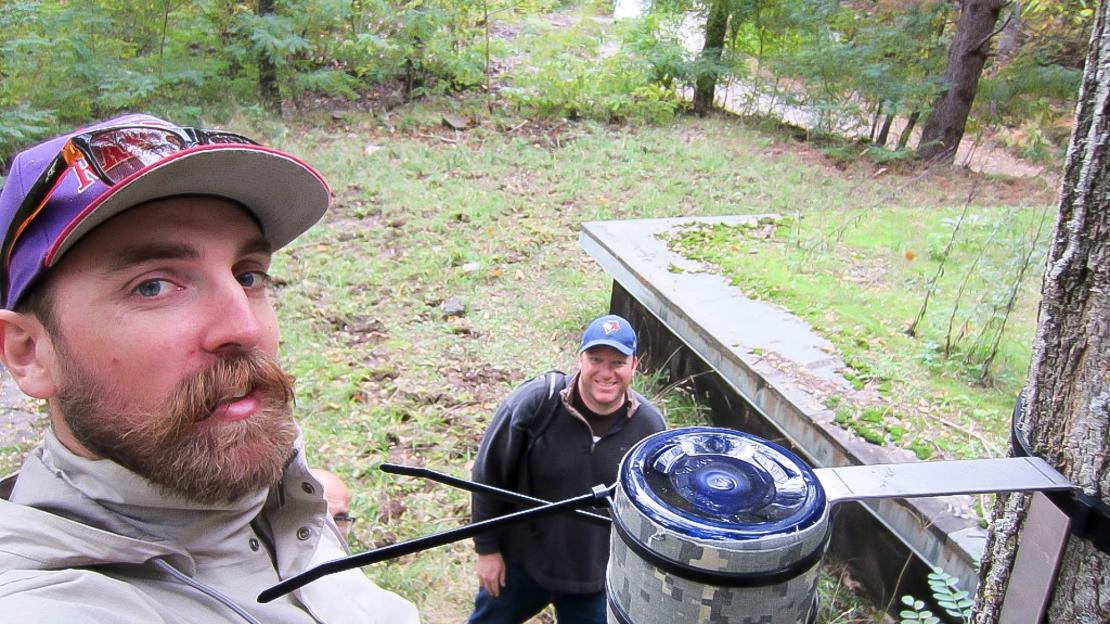An innovative air sampler that can monitor mercury pollution around the world has earned a U of T Scarborough researcher Canada’s top academic award.
David McLagan from the Department of Physical and Environmental Sciences has received the Governor General’s Gold Medal for his work in developing a passive air sampler that can monitor airborne mercury, particularly in remote areas and in the developing world.
“I’m very proud of the fact we were able to get the sampler to a stage where it’s a finished product,” says McLagan, who defended his PhD in January.
“It’s really satisfying to know we were able to rigorously test the sampler before putting it in the field, and the fact it’s also being commercialized is also exciting.”
Unlike active air samplers that rely on electricity and a supply of argon gas to run, the passive sampler developed by McLagan uses the natural movements of air and a carbon material to capture mercury floating around in the atmosphere. This is especially important for remote locations where there is no electricity, namely the southern hemisphere where there are relatively few mercury monitoring sites.
McLagan designed, developed and tested the sampler over his four-and-a-half years at U of T Scarborough as a graduate student. Before being able to even develop a robust prototype, McLagan had to extensively research whether using carbon to trap mercury would work.
After coming up with a design he collaborated with John Ford and his team at the Department of Chemistry’s machine shop on the St. George campus, who created the different components for the sampler. Each sampler contains seven individual components, all of which were manufactured by hand, while it only takes a few minutes to assemble one sampler.
“It really speaks to the amazing work John’s team does,” says McLagan. “They were the creative engineering hand that made the prototype we developed a reality.”
Once a working prototype was ready, it had to be tested in the field to see how it could match the performance of active samplers. There are currently around a thousand of McLagan’s air samplers deployed at various sites around the world, including South America, Africa, and even the middle of the Indian Ocean.
READ ABOUT MCLAGAN'S FIELD WORK AT AN ACTIVE VOLCANO IN NEW ZEALAND
Monitoring airborne mercury is important since it’s unreactive and persistent in the atmosphere, so it can be transported great distances. Once it reacts with oxidants it can be deposited as an environmental contaminant.
Once deposited out of the atmosphere, often in locations far away from its original source, mercury can work its way into sediments where it can be transformed into methylmercury, which is the most toxic and alarming form from a human health perspective. As an acute neurotoxin (among other health concerns) it’s been linked to a host of brain and nervous system disorders and is especially concerning for cognitive development in utero and in children.
The Governor General’s Gold Medal is widely considered one of the most prestigious academic medals that students in Canadian schools can receive. This year Dr. Mark Wade from U of T's Department of Applied Psychology and Human Development also received the honour. “I was very surprised when I first learned I received the award and truthfully I’m still blown away. It’s been very humbling,” says McLagan.
“David’s curiosity for science is insatiable,” says Carl Mitchell, an associate professor in the Department of Physical and Environmental Science who supervised McLagan along with Professor Frank Wania.
“His willingness to seek out and collaborate with new colleagues around the world has been an important key to his success, especially when it came to testing his air sampler. In light of recent efforts to curb global mercury pollution, his work is likely to have a significant impact on global pollution policy.”
McLagan is currently working at Environment Canada helping to set up a lab that can analyze the data from the samplers for future mercury monitoring projects, which is part of Canada’s obligations to monitor and reduce mercury emissions under the UN’s Minamata Convention.
He’s also working with an external company in order to commercialize the sampler, and will also start a postdoc at the Technical University of Braunschweig and the University of Vienna this upcoming September.
“I’m fortunate to be where I am professionally and a lot of it comes down to having both [Professors Wania and Mitchell] as supervisors,” he adds.
